JUNE 2010 DOWNLOAD ROUNDUP
Brian Wilson
|
MusicWeb is preparing
to offer selected downloads. Here is a taster
Sergei
PROKOFIEV
(1891-1953) Six Pieces
from the ballet Romeo and Juliet (1935) – transcribed
by Vadim Borisovsky [22:14] Dmitri
SHOSTAKOVICH (1906-1975) Seven Preludes from
Op.34 (1933) – transcribed by Vadim Borisovsky; Nos.10,
14, 15, 16, 17, 18, 24 [10:26] Viola Sonata Op.147 (1975)
[31:36]  Robin Ireland (viola) Tim Horton (piano) rec. July 2009
at Potton Hall, Suffolk from
Robin Ireland (viola) Tim Horton (piano) rec. July 2009
at Potton Hall, Suffolk from  NIMBUS NI 6117 [65:30] £8 dollar equivalent
NIMBUS NI 6117 [65:30] £8 dollar equivalent
Download here CD review here
Watch
this space ....
|
This Roundup contains reviews of Beulah’s June
2010 releases – please watch out for my article on their older
issues, which I am working on at the moment: expect it soon.
You may also wish to refer to my recent article on Gimell downloads
of the Tallis Scholars - here.
Recording of the Month
Giuseppe VERDI (1813-1901)
Requiem (1874) [84:19]
Anja Harteros (soprano); Sonia Ganassi (mezzo); Rolando Villazon
(tenor); René Pape (bass) Coro e Orchestra dell’Accademia
Nazionale di Santa Cecilia/Antonio Pappano
rec. live, 8-13 January 2009, Sala Santa Cecilia, Auditorium
Parco della Musica, Rome. DDD.
EMI CLASSICS 698936 2 [47:29 + 37:50] - from passionato
(mp3)
- see reviews by Jack
Buckley and Simon Thompson and Michael
Cookson
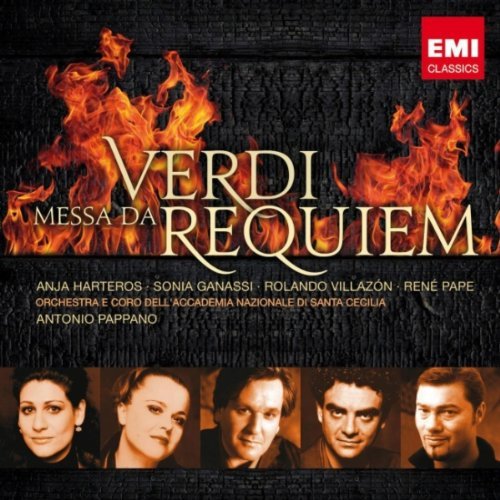 I
have made this Recording of the Month with reservations, one
of which concerns the very wide dynamic range of the recording
(see below). Another relates to my continuing love of earlier
versions, especially the EMI Giulini which I extolled in my
October,
2009, Roundup. Finally, Passionato’s pricing
policy makes the download actually more expensive than the physical
CDs, since they are offered at mid price. Passionato should
seriously consider making permanent the reduction to £11.99
for this set, which was on offer when I downloaded it. Amazon.co.uk
have this recording for £11.99, complete with digital booklet,
albeit at the lower 256kbps bit-rate.
I
have made this Recording of the Month with reservations, one
of which concerns the very wide dynamic range of the recording
(see below). Another relates to my continuing love of earlier
versions, especially the EMI Giulini which I extolled in my
October,
2009, Roundup. Finally, Passionato’s pricing
policy makes the download actually more expensive than the physical
CDs, since they are offered at mid price. Passionato should
seriously consider making permanent the reduction to £11.99
for this set, which was on offer when I downloaded it. Amazon.co.uk
have this recording for £11.99, complete with digital booklet,
albeit at the lower 256kbps bit-rate.
There is one important point which Michael
Cookson makes, which I must emphasise - the opening is so quiet
that I thought at first that the download of the first track
had failed to materialise. In anything other than the most ideal
conditions - MC mentions listening in the car - the first two
minutes of music are lost. Otherwise the 320k mp3 sound reproduces
very well.
Early Music Discovery of the Month
Pierre MOULU
(? 1484–c.1550) Mater floreat
4vv [5:41]; Missa Missus est Gabriel angelus I 4vv
[25:14]
JOSQUIN DES PREZ (c.1450/55-1521)
Missus est Gabriel angelus 4vv [4:09]
Pierre MOULU In pace
5vv [8 :52]
Missa Alma redemptoris mater (Messe à deux
visaiges ou plus) 4vv [22 :50]
Kyrie (alternative ‘long’
version) 4vv [2:49]
Agnus Dei (alternative ‘long’ version) 5vv [5:01]
The Brabant Ensemble/Stephen Rice
rec. Chapel of Harcourt Hill Campus, Oxford Brookes University,
4– 6 September 2009. DDD.
Texts and translations available as pdf document.
HYPERION CDA67761 [74:38] – from Hyperion
(mp3 and lossless)
 Hyperion
and the Brabant Ensemble again put us in their debt, this time
with the music of Moulu, a composer who was not known to me
even as a name before hearing this recording. This new CD deserves
to have the widest possible circulation in all formats.
Hyperion
and the Brabant Ensemble again put us in their debt, this time
with the music of Moulu, a composer who was not known to me
even as a name before hearing this recording. This new CD deserves
to have the widest possible circulation in all formats.
Two small grumbles – I have queried before
the practice of performing the work on which the Mass is based
– in this case Josquin’s Missus est Gabriel – after,
rather than before the Mass itself. Surely, too, the translation
of Crescat celebris Du Fay cadentia in Mater floreat
as ‘May Du Fay’s famous fall grow’ is doubly misleading.
Cadentia does mean ‘fall’ and there is a pun on that
and crescat (may it grow or rise up), but it also means
a musical cadence, and that is surely the primary meaning. Also,
celebris is genitive, agreeing with (indeclinable) Du
Fay – it’s the composer Guillaume Du Fay who is famous, not
his fall/cadence. (I’m informed that Hyperion, having employed
a copyright translation, were not at liberty to alter it.) Otherwise,
as always, it is very useful to have the translation available
at the click of a mouse when playing the music in Squeezebox.
Contemporary Music Discovery of the Month
Edward GREGSON (b.1945)
Trombone Concerto (1979) [14:41]
Peter Moore (trombone); BBC Concert Orchestra/Bramwell Tovey
rec. Watford Colosseum, 1 March, 2010. DDD.
CHANDOS CHAN10627 [14:41] – download only from theclassicalshop.net
(mp3 and lossless sound)
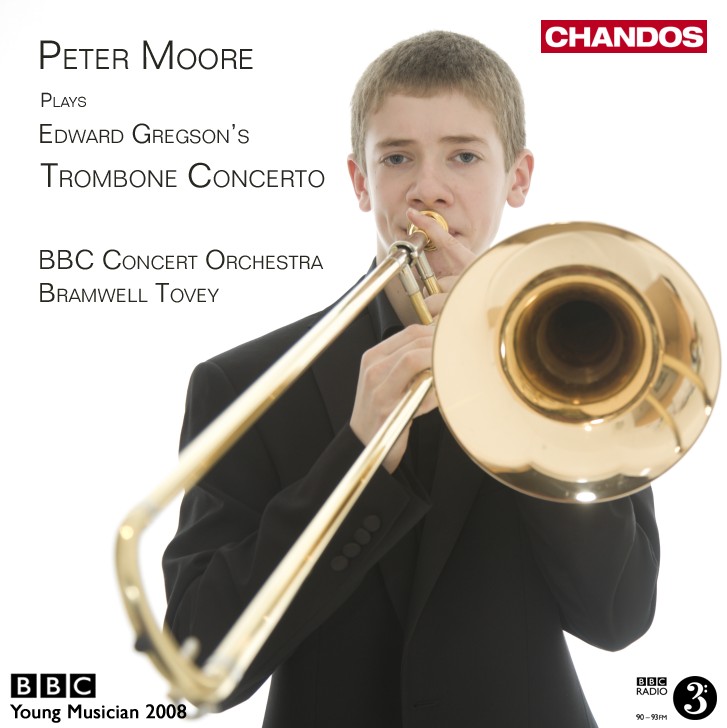 By
the time that this Roundup appears, my fuller review of this
download may well have appeared among the main CD reviews. Overall
this new recording impressed me. I shall want to return to it
for the sake of the music – less immediately appealing than,
say, Gordon Jacob’s Trombone Concerto, but ultimately
more satisfying, I think. I hope that it bucks the trend of
concertos for brass instruments to be less than popular.
By
the time that this Roundup appears, my fuller review of this
download may well have appeared among the main CD reviews. Overall
this new recording impressed me. I shall want to return to it
for the sake of the music – less immediately appealing than,
say, Gordon Jacob’s Trombone Concerto, but ultimately
more satisfying, I think. I hope that it bucks the trend of
concertos for brass instruments to be less than popular.
I happily yield to the composer’s own high
assessment of Peter Moore, winner of the 2008 BBC Young Musician
competition, as soloist, and the accompaniment and recording
are all I could wish them to be. Even if you intend to buy the
CD when it appears, I don’t think you will regret spending a
couple of pounds on the download now. If Chandos would include
some notes, my satisfaction would be complete. These sometimes
appear a week or so after the download appears, so keep looking
– but they still had not materialised three weeks later.
Giovanni Pierluigi da PALESTRINA
(1525/6–1594)
 Viri
Galilæi [6:07]; Missa Viri Galilæi [33:41];
O rex gloriæ [3:32]; Missa O rex gloriæ
[24:10]
Viri
Galilæi [6:07]; Missa Viri Galilæi [33:41];
O rex gloriæ [3:32]; Missa O rex gloriæ
[24:10]
The Choir of Westminster Cathedral/James O’Donnell
rec. Westminster Cathedral, London, 22-24 June, 1988. DDD. Texts
and translations available as pdf document.
HYPERION HELIOS CDH55335 [67:39] – from Hyperion
(mp3 and lossless)
Hyperion place the lovers of renaissance polyphony
doubly in their debt with the Moulu recording and the self-recommending
reissue of this Palestrina CD of two Ascension-tide Masses.
Venetian Treasures
Antonio CALDARA (c. 1671-1736)
Crucifixus a 16 [4:56]
Andrea GABRIELI
(?1532/3-1585)De profundis [6:43]
Claudio MONTEVERDI (1567-1643)
Domine ne in furore tuo [3:57]
Francesco CAVALLI (1602-1676)
Salve Regina [6:25]
Giovanni GABRIELI (c. 1553-1612)
Hodie completi sunt [3:48]
Orlandus LASSUS (c. 1532-1594)
Missa Bell’ Amfritit’
Altera[25:26]; Tui sunt coeli [3:10]
Antonio CALDARA Stabat
Mater [17:22]
The Sixteen/Harry Christophers – rec. 1992. DDD.
CORO COR16053 [69:37] - from theclassicalshop
(mp3 and lossless). Booklet with texts available from Naxos
Music Library here.
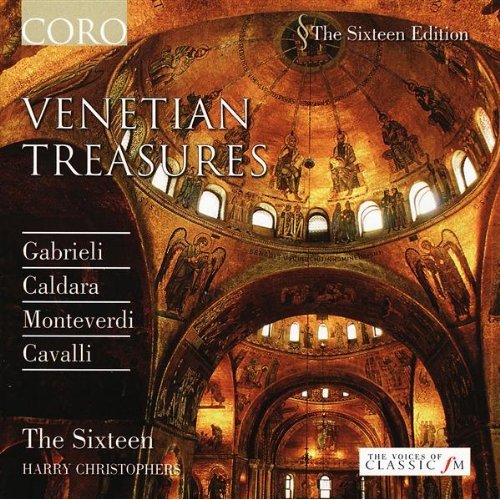 The
mp3 version of this recording was Chandos’s free download with
theclassicalshop.net’s newsletter in May 2010, a valuable bonus
for subscribers to this free service which is well worth signing
up to. Performances and recording of this excellent overview
of Venetian music from the early 16th century to
the late 17th are all that we expect from this source,
even in mp3 format. Subscribers to the Naxos Music Library may
listen to it there
and also obtain the booklet. Best of all, this recording does
not duplicate any of my recommendations from the Gimell catalogue
here.
The
mp3 version of this recording was Chandos’s free download with
theclassicalshop.net’s newsletter in May 2010, a valuable bonus
for subscribers to this free service which is well worth signing
up to. Performances and recording of this excellent overview
of Venetian music from the early 16th century to
the late 17th are all that we expect from this source,
even in mp3 format. Subscribers to the Naxos Music Library may
listen to it there
and also obtain the booklet. Best of all, this recording does
not duplicate any of my recommendations from the Gimell catalogue
here.
Robert JOHNSON (1583-1633)
Lute Music
The Princes’s Almain - Masque - Coranto [4:25]; Pavan I in c
minor [5:16]; Galliard, ‘My Lady Mildemays Delight’ [1:42];
Pavan II in f minor [7:24]; 2 Almains [2:42]; The Noble Man
[2:52]; The Witches’ Dance [1:51]; Pavan III in c minor [6:50];
3 Almains [4:42]; The Fairies’ Dance [2:16]; Fantasia (Fantasie)
[3:27]; Galliard [1:40]; Almain, ‘Lady Strang’s’ [1:03]; Pavan
IV [3:45]; The First, Second, and Third Dances in the Prince’s
Masque [3:49]; 3 Almains [3:15]; Satyr’s Dance [3:12]
Nigel North (lute) – rec? DDD.
NAXOS 572178 [60:11] – download only from classicsonline
(mp3) or streamed from Naxos Music Library here.
 Naxos
already have one CD of the lute music of Robert Johnson (Christopher
Wilson and Shirley Rumsey, 8.550776). Now, after a gap of some
seven years, they add a second volume, this time with Nigel
North, who has recorded Dowland’s complete lute music; the new
recording is available only as a download at present.
Naxos
already have one CD of the lute music of Robert Johnson (Christopher
Wilson and Shirley Rumsey, 8.550776). Now, after a gap of some
seven years, they add a second volume, this time with Nigel
North, who has recorded Dowland’s complete lute music; the new
recording is available only as a download at present.
Johnson’s music may not be quite as accomplished
or as well known as Dowland’s, but it is well worth hearing,
and there can be no better advocate than Nigel North, whose
Dowland has won many plaudits, my own small contribution among
them. Please refer to the review of the complete 4-CD set, 8.504016,
here,
with links to the reviews of individual volumes. North’s playing
is every bit as fine here as on those Dowland recordings, though
I was surprised to hear a degree of extraneous finger noise,
which I don’t recall from the earlier programmes.
As it happens, I have another recording of
Johnson’s music in my in-tray at the moment, containing several
of his lute songs, coupled with those of some of his younger
contemporaries and culminating with Purcell (With endless
teares, Johannette Zomer and Fred Jacobs, Channel Classics
hybrid SACD CCSSA26609). On first hearing, that would make an
excellent follow-up to the present download. The SACD track
of the Channel Classics disc is superb, but the Naxos, though
only available as a 320 kbps mp3 download, is not far behind.
Heinrich SCHÜTZ
(1585-1672
Lukas Passion (St Luke Passion), SWV480 (1666) [52:42]
Johann Linderoth (tenor), Evangelist; Jacob Bloch Jespersen
(bass-baritone), Jesus
Ars Nova Copenhagen/Paul Hillier
rec. 10-11 April 2007, St Paul’s Church, Copenhagen, Denmark.
DDD
DACAPO 8.226019 [52:41] – from passionato (mp3 and lossless)
 Mark
Sealey has reviewed this recording in some detail – here
– so I shall not try to repeat what he has already written,
except to stress his point that Schütz’s passions are altogether
much sparser than the familiar Bach works and far less colourful
than we normally expect from Schütz himself. The performance
and recording are excellent but there are no notes with the
download and no text, though Luther’s translation of Luke is
readily available, including online, as, of course, are English
versions old and new.
Mark
Sealey has reviewed this recording in some detail – here
– so I shall not try to repeat what he has already written,
except to stress his point that Schütz’s passions are altogether
much sparser than the familiar Bach works and far less colourful
than we normally expect from Schütz himself. The performance
and recording are excellent but there are no notes with the
download and no text, though Luther’s translation of Luke is
readily available, including online, as, of course, are English
versions old and new.
Arcangelo CORELLI
(1653-1713) La Folia (Variations sérieuses)
Alfredo Campoli/Edward Gritton – rec. 1947. Mono. ADD.
BEULAH EXTRA 4BX10 [11:32] – from Beulah
(mp3)
 This
is one for fans of Campoli rather than baroque specialists,
who nowadays have many more and more historically aware recordings
of Corelli and other exponents of the persistent theme known
as La Folia or Les Folies d’Espagne to choose
from. Specialists will prefer Elizabeth Wallfisch with Richard
Boothby and Robert Woolley in the original sonata, Op.5/12 on
Hyperion Helios CDH55240 (budget price CD and mp3/lossless download,
with other Corelli sonatas – see review)
or with different partners in the complete Op.5 on Hyperion
2-for-1 Dyad (CDD22047) or the recording of Op.5/7-12 by François
Fernandez and Glen Wilson on Naxos 8.557799 which I reviewed
some time ago. Nevertheless, Campoli is always worth hearing,
and the Beulah recording is more than tolerable.
This
is one for fans of Campoli rather than baroque specialists,
who nowadays have many more and more historically aware recordings
of Corelli and other exponents of the persistent theme known
as La Folia or Les Folies d’Espagne to choose
from. Specialists will prefer Elizabeth Wallfisch with Richard
Boothby and Robert Woolley in the original sonata, Op.5/12 on
Hyperion Helios CDH55240 (budget price CD and mp3/lossless download,
with other Corelli sonatas – see review)
or with different partners in the complete Op.5 on Hyperion
2-for-1 Dyad (CDD22047) or the recording of Op.5/7-12 by François
Fernandez and Glen Wilson on Naxos 8.557799 which I reviewed
some time ago. Nevertheless, Campoli is always worth hearing,
and the Beulah recording is more than tolerable.
Luigi BOCCHERINI (1743-1805)
Scuola di Ballo (arr. Jean FRANÇAIX)
London Philharmonic Orchestra/Antal Dorati – rec.1939. Mono.
ADD.
BEULAH EXTRA 1BX14 [17:01] – from Beulah
(mp3)
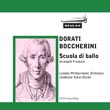 Ten
pieces by Boccherini, arranged for a ballet by Jean Françaix
in or before 1933 and performed by the Ballet Russe de Monte-Carlo
under the direction of Dorati, who recorded the music in 1939.
I’m normally a great fan of this kind of pastiche, but I must
admit to being underwhelmed by the present concoction, though
it’s all well played and the transfer is very good for its age.
The 1998 Pearl CD including the same performance seems to have
disappeared from the catalogue. I was about to write that there
was no current version of this music until I discovered that
there is a Hyperion recording, coupled with other works by Françaix
(CDA67323 – see review).
Ten
pieces by Boccherini, arranged for a ballet by Jean Françaix
in or before 1933 and performed by the Ballet Russe de Monte-Carlo
under the direction of Dorati, who recorded the music in 1939.
I’m normally a great fan of this kind of pastiche, but I must
admit to being underwhelmed by the present concoction, though
it’s all well played and the transfer is very good for its age.
The 1998 Pearl CD including the same performance seems to have
disappeared from the catalogue. I was about to write that there
was no current version of this music until I discovered that
there is a Hyperion recording, coupled with other works by Françaix
(CDA67323 – see review).
Luigi BOCCHERINI Overture
in D, Op.43
Philharmonia Orchestra/Carlo Maria Giulini – rec. 1959 stereo
DDD.
BEULAH EXTRA 1BX8 [6:13] – from Beulah (mp3)
Joseph HAYDN (1732-1809) Symphony
No.94 in G (‘Surprise’)
Philharmonia Orchestra/Carlo Maria Giulini – rec. 1959 stereo
DDD.
BEULAH EXTRA 2BX8 [20:24] – from Beulah
(mp3)
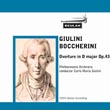
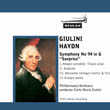 I
didn’t know that Giulini had recorded Haydn – not a composer
with whom I associate him, nor would we necessarily associate
Haydn with Boccherini as a bedfellow today - though I see that
the coupling was well received at the time of its issue. Both
performances still sound stylish and the recordings are no hindrance
to enjoyment. The Boccherini costs a mere £0.50, the Haydn £1.50.
Try an extract on YouTube here.
I
didn’t know that Giulini had recorded Haydn – not a composer
with whom I associate him, nor would we necessarily associate
Haydn with Boccherini as a bedfellow today - though I see that
the coupling was well received at the time of its issue. Both
performances still sound stylish and the recordings are no hindrance
to enjoyment. The Boccherini costs a mere £0.50, the Haydn £1.50.
Try an extract on YouTube here.
Symphony No.95
London Symphony Orchestra/Sir Hamilton Harty – rec. 1935. Mono.
ADD
BEULAH EXTRA 3BX25 [15:03] – from Beulah
(mp3)
 Haydn
symphonies on record were something of a rarity in 1935, so
that the Gramophone reviewer felt it necessary to explain
patiently: “This is one of the works that Haydn composed for
his London concerts. It is known as London Symphony No. 5 [sic],
and was written in 1791, for the first visit.” Today’s listeners
are much more likely to know what comprises the two sets of
'London’ symphonies and there is a wide range of choice of performances,
but then it was the only version available. The small scale
of the performance was noted with approval and it still sounds
quite stylish. The longer movements are abridged to fit on four
78 rpm sides.
Haydn
symphonies on record were something of a rarity in 1935, so
that the Gramophone reviewer felt it necessary to explain
patiently: “This is one of the works that Haydn composed for
his London concerts. It is known as London Symphony No. 5 [sic],
and was written in 1791, for the first visit.” Today’s listeners
are much more likely to know what comprises the two sets of
'London’ symphonies and there is a wide range of choice of performances,
but then it was the only version available. The small scale
of the performance was noted with approval and it still sounds
quite stylish. The longer movements are abridged to fit on four
78 rpm sides.
Harty from 1935 is no match for Giulini in
1959 in terms of recorded sound – even at the time, the sound
was judged to be clear but not exciting. It now sounds rather
sub-fusc but tolerable, and the transfer is virtually free of
surface noise, except in the run-out groove at the end. (Why
was that retained?) In 1935, the asking price of 5 shillings
was regarded as a ‘boon’: so is its availability now for £1.
The World on the Moon – Orchestral Suite
Charles Brill Orchestra/Charles Brill – rec. 1938. Mono. ADD
BEULAH EXTRA 1BX15 [14:51] – from Beulah
(mp3)
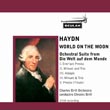 Even
today, Haydn’s operas are not exactly well known, so this orchestral
suite from Il mondo della luna still makes interesting
listening. The performance is stylish – a little deliberate
in places – and the recording tolerable, with hardly any surface
noise. Well worth £1 of anyone’s hard-earned money. A typo on
the downloadable cover, which identifies Charles Brill as Chrales
Brill is a reassuring sign that I’m not the only two-finger
typist who reverses letters. I was even more gratified to see
my review of the Beulah CDs of Anthony Collins’ Sibelius attributed
to ‘Brain’ Wilson on the website.
Even
today, Haydn’s operas are not exactly well known, so this orchestral
suite from Il mondo della luna still makes interesting
listening. The performance is stylish – a little deliberate
in places – and the recording tolerable, with hardly any surface
noise. Well worth £1 of anyone’s hard-earned money. A typo on
the downloadable cover, which identifies Charles Brill as Chrales
Brill is a reassuring sign that I’m not the only two-finger
typist who reverses letters. I was even more gratified to see
my review of the Beulah CDs of Anthony Collins’ Sibelius attributed
to ‘Brain’ Wilson on the website.
Piano Trio in G, Op.73/2, Hob.XV/25 (‘Gypsy’)
Alfred Cortot, Jacques Thibaud and Pablo Casals – rec.1927.
Mono. ADD.
BEULAH EXTRA 1BX87 [12:50] – from Beulah
(mp3)
 This
is as classic a recording as you are likely to find – if memory
serves correctly, it once featured in the History of Music series
of recordings: it certainly deserves to have done so. Even today
there is very little about the performance that could be criticised
and the recording holds up extremely well for its date: some
78s from 20 years later wouldn’t pass muster to the same extent,
and there is almost no surface noise. For an equally classic
modern performance of the ‘Gypsy’ and three of its companions,
go to the Florestan Trio on Hyperion CDA67719 (CD or
mp3 or lossless download here).
This
is as classic a recording as you are likely to find – if memory
serves correctly, it once featured in the History of Music series
of recordings: it certainly deserves to have done so. Even today
there is very little about the performance that could be criticised
and the recording holds up extremely well for its date: some
78s from 20 years later wouldn’t pass muster to the same extent,
and there is almost no surface noise. For an equally classic
modern performance of the ‘Gypsy’ and three of its companions,
go to the Florestan Trio on Hyperion CDA67719 (CD or
mp3 or lossless download here).
Wolfgang Amadeus MOZART (1756-1791)
Symphony No.36 in G, K425 (‘Linz’)
London Symphony Orchestra/Enrique Jorda – rec. 1946.
ADD
BEULAH EXTRA 2BX57 [24:57] - from Beulah
(mp3)
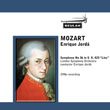 Like
all the Beulah Extra downloads, this is available only as a
320kbps AAC file, with no CD equivalent. The performance still
holds up well – light and appealing – and the recording was
good enough not to interfere with my enjoyment, with very little
surface noise. All in all, this is well worth the asking price
of £1.50.
Like
all the Beulah Extra downloads, this is available only as a
320kbps AAC file, with no CD equivalent. The performance still
holds up well – light and appealing – and the recording was
good enough not to interfere with my enjoyment, with very little
surface noise. All in all, this is well worth the asking price
of £1.50.
Ferdinand HÉROLD (1791-1833)
Overture: Zampa
London Philharmonic Overture/Basil Cameron – rec. 1946. Mono.
ADD.
BEULAH EXTRA 2BX27 [7:26] – from Beulah
(mp3)
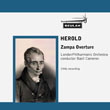 Hérold’s
music is not so much in vogue these days: even the confection
which John Lanchbery arranged for the ballet La fille mal
gardée is not as popular as it once was. This recording
of the overture to Zampa reminds us of the attractions
of his music, in a stylish performance, and the transfer of
the recording is perfectly acceptable. Beulah have an alternative
performance of this overture on CD (1PD4 – ‘78 Classics’, performed
by the Bournemouth and Berlin Philharmonic Orchestra under Isidore
Godfrey and Hans Pfitzner).
Hérold’s
music is not so much in vogue these days: even the confection
which John Lanchbery arranged for the ballet La fille mal
gardée is not as popular as it once was. This recording
of the overture to Zampa reminds us of the attractions
of his music, in a stylish performance, and the transfer of
the recording is perfectly acceptable. Beulah have an alternative
performance of this overture on CD (1PD4 – ‘78 Classics’, performed
by the Bournemouth and Berlin Philharmonic Orchestra under Isidore
Godfrey and Hans Pfitzner).
Gioacchino ROSSINI (1792-1868)
L’Italiana in Algeri (1813) (critical edition by Fondazione
Rossini, edited by Azio Corghi)
Lorenzo Regazzo (bass) - Mustafà; Ruth Gonzalez (soprano)
- Elivira; Elsa Giannoulidou (mezzo) - Zulma; Giulio Mastrototaro
(bass) - Haly; Lawrence Brownlee (tenor) - Lindoro; Marianna
Pizzolato (alto) - Isabella; Bruno De Simone (bass) - Taddeo;
Transylvania State Philharmonic Choir, Cluj; Virtuosi Brunensis/Alberto
Zedda – rec. live, July 2008. DDD.
The Italian libretto may be accessed at www.naxos.com/libretti/660284.htm
or from the Naxos Music Library here.
NAXOS 8.660284/85 [68:57 + 67:17] – from classicsonline
(mp3)
 This
new recording competes in the same budget-price range as the
recent Sony reissue, which received a lukewarm welcome from
Robert J Farr here.
Like the Naxos version of Il Turco in Italia – see review
– beginners could do much worse than start with this live version.
If you had paid £10 to hear this production, you would hardly
have thought yourself short-changed, but for a little more (£12.99)
passionato have a safer recommendation in the form of the 1987
Claudio Abbado recording with Agnes Baltsa, Frank Lopardo and
Ruggiero Raimondi (427 3312 here).
Passionato also have the older (1963) Berganza/Coreno/Panerai/Varviso
(475 8275 here,
no longer available on CD in the UK) for the same price.
This
new recording competes in the same budget-price range as the
recent Sony reissue, which received a lukewarm welcome from
Robert J Farr here.
Like the Naxos version of Il Turco in Italia – see review
– beginners could do much worse than start with this live version.
If you had paid £10 to hear this production, you would hardly
have thought yourself short-changed, but for a little more (£12.99)
passionato have a safer recommendation in the form of the 1987
Claudio Abbado recording with Agnes Baltsa, Frank Lopardo and
Ruggiero Raimondi (427 3312 here).
Passionato also have the older (1963) Berganza/Coreno/Panerai/Varviso
(475 8275 here,
no longer available on CD in the UK) for the same price.
Hector BERLIOZ (1803-1869)
Harold in Italy, H68 [40:26]; Les Troyens – Ballet Music
[11:31]
Tabea Zimmermann (viola); London Symphony Orchestra/Colin Davis
rec. live, Barbican, London, 16-17 February 2003; 3-9 December
2000. DDD/DSD
LSO LIVE LSO0040 [51:57] – from passionato
(mp3)
 This
is the most recent of Colin Davis’s three recordings of Harold
in Italy, a live recording made in the Barbican concert
hall. In some respects I still prefer the first version, with
Yehudi Menuhin, still available at budget price on Classics
for Pleasure 5218462, a recording which doesn’t take quite so
long to get off the ground, but I am swimming against the critical
tide, which inclines to the LSO Live version. It’s not that
I dislike the new recording, merely that I prefer the older
version, which can be downloaded from amazon.co.uk for £4.99.
This
is the most recent of Colin Davis’s three recordings of Harold
in Italy, a live recording made in the Barbican concert
hall. In some respects I still prefer the first version, with
Yehudi Menuhin, still available at budget price on Classics
for Pleasure 5218462, a recording which doesn’t take quite so
long to get off the ground, but I am swimming against the critical
tide, which inclines to the LSO Live version. It’s not that
I dislike the new recording, merely that I prefer the older
version, which can be downloaded from amazon.co.uk for £4.99.
If you want to go back further, to the classic
William Primrose/Philharmonia/Thomas Beecham recording, this
comes for the price of four tracks, potentially less than £1,
in less than ideal sound from eMusic.
The LSO Live download from passionato in 320kbps
sound costs £5.99, the same as buying the CD direct from the
LSO shop; the iTunes equivalent, in 256kbps sound, is uncompetitive
at £7.99.
Richard WAGNER
(1813-1883) Die Walküre
James King (tenor) - Siegmund; Régine Crespin (soprano)
- Sieglinde; Birgit Nilsson (soprano) - Brünnhilde; Hans
Hotter (bass-baritone) - Wotan; Christa Ludwig (mezzo) - Fricka);
Gottlob Frick (bass) - Hunding; Vienna State Opera Chorus; Vienna
Philharmonic Orchestra/Georg Solti
DECCA 455 5592 [4 CDs, 65:50 + 64:18 + 28:34 + 70:21]
– from passionato
(mp3)
James King (tenor) - Siegmund; Leonie Rysanek (soprano) - Sieglinde;
Gerd Nienstedt (bass) - Hunding; Birgit Nilsson (soprano) -
Brünnhilde; Theo Adam (bass) - Wotan; Annelies Burmeister
(mezzo) - Fricka; Bayreuth Festival Chorus and Orchestra/Karl
Böhm
PHILIPS 50 464 7512 [4 CDs: 62:13 + 57:29 + 47:42 + 43:20]
– from passionato
(mp3)

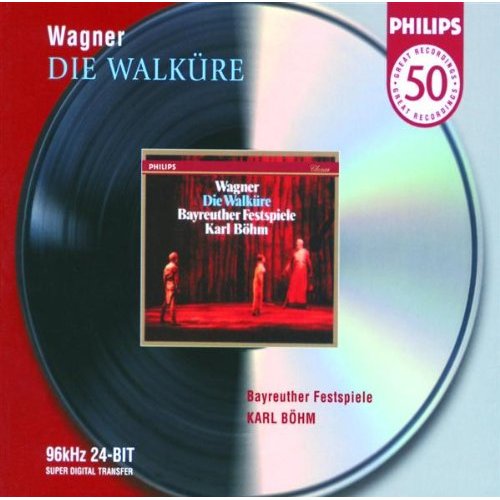 I
have just been listening intensively to three versions of Götterdämmerung:
the new live Hallé performance directed by Mark Elder
(5 CDs, CDHLD7525 or one mp3 CD, CDHLM7530) and the now classic
Solti and Karajan accounts. As a result, I have now changed
my opinion that Rheingold and Siegfried represent
for me the high points of the cycle, by comparison with which
parts of Götterdämmerung fail to live up. I
just had not been listening attentively enough.
I
have just been listening intensively to three versions of Götterdämmerung:
the new live Hallé performance directed by Mark Elder
(5 CDs, CDHLD7525 or one mp3 CD, CDHLM7530) and the now classic
Solti and Karajan accounts. As a result, I have now changed
my opinion that Rheingold and Siegfried represent
for me the high points of the cycle, by comparison with which
parts of Götterdämmerung fail to live up. I
just had not been listening attentively enough.
I ended that review with an intention to return
to Die Walküre, to see if similarly intensive listening
could convince me that Acts 1 and 2 were on a par with Act 3
– a discrepancy which probably arises from my having first heard
the Todesverkündigung and Act 3 in isolation many
years ago, in Solti’s first shot at part of the Ring,
with Kirsten Flagstad. I have not yet had time to complete that
intensive exercise with Die Walküre, but I have
to say that the Solti and Böhm recordings have already
gone some way to convincing me. Previously my only recordings
of Walküre had been the classic Flagstad Act 3 (now
coupled with Act 1 under Knappertsbusch, Australian Eloquence
480 1892, 2 CDs at super-budget price from Buywell)
and a recording made by Leinsdorf with Nilsson, London and Vickers,
originally issued on RCA but now on Decca and recently reissued
again at budget price (470 4432, typically less than £20).
All four versions have their advantages and
disadvantages. It would be nice to combine the generally vigorous
pace of Böhm and Leinsdorf (who fits the opera onto 3 CDs)
with the quality of recording which Decca achieved for the complete
Solti. Flagstad was past her best when she made the Eloquence
recording, but she still sounds magnificent and that remains
the Act 3 which I play the most. Nilsson is superb in all three
versions on which she features – perhaps at her best for Böhm,
but that version is vitiated slightly for me by Rysanek’s less
than ideal Sieglinde. King and Nilsson are common to both the
Solti and Böhm versions and both more than make up for
any shortcomings there.
The Böhm was issued separately on the
Philips 50 series as the pick of his complete Bayreuth Ring,
recorded live in 1966 and 1967. It seems to be no longer generally
available on CD, though some dealers still have it for around
£34; the download, in good mp3 sound, is the least expensive
way to obtain it. Passionato also have the complete Böhm
Ring (446 0572 here
for an economical £40.99). If anything, it’s the Böhm that
has most convinced me of the value of Act 1 and the importance
of Act 2.
I’m confident that when I’ve completed an intensive
rehearing of the Leinsdorf and the Flagstad/Solti, together
with the Böhm and the complete Solti Walküre,
I shall not think of any parts of this opera as inferior to
the rest of the cycle. Now I have to convince myself about Lohengrin.
Passionato also have the Leinsdorf recording here,
though, in this case, the download will save little or nothing
by comparison with the 3-CD set.
Niels Wilhelm GADE (1817–1890)
Symphonies, Volume 3
Efterklange af Ossian (Echoes of Ossian), Concert Overture,
Op. 1 [13:08]
Symphony No. 3 in a minor, Op. 15 [28:24]
Discarded first movement from Symphony No. 3* [9:20]
Symphony No. 6 in g minor, Op. 32 [25:54]
Danish National Symphony Orchestra, DR/Christopher Hogwood
rec. August, 2002. DDD.
All works performed from The Niels W. Gade Edition. *premiere
recording
CHANDOS CHAN9795 [77:02] – from theclassicalshop
(mp3 and lossless)
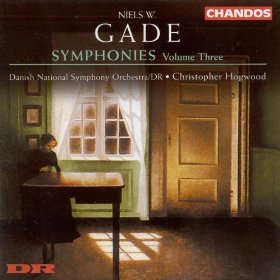 Though
I had heard other works by Gade, I had not come across Ossian
until I discovered a Beulah Extra download of a recording
by John Frandsen, with an earlier version of the Danish National
SO, dating from 1958. Beulah have done their best to present
that recording, originally issued on a Philips 10” LP, coupled
with Hartmann’s Håkon Jarl Overture, also available
from Beulah Extra – find them both on 1BX44 and 2BX44
here
– but, inevitably, the more recent 20-bit DDD Chandos recording
sounds much better.
Though
I had heard other works by Gade, I had not come across Ossian
until I discovered a Beulah Extra download of a recording
by John Frandsen, with an earlier version of the Danish National
SO, dating from 1958. Beulah have done their best to present
that recording, originally issued on a Philips 10” LP, coupled
with Hartmann’s Håkon Jarl Overture, also available
from Beulah Extra – find them both on 1BX44 and 2BX44
here
– but, inevitably, the more recent 20-bit DDD Chandos recording
sounds much better.
César FRANCK (1822-1890)
Chorales Nos.1-3
Marcel Dupré
rec. organ of St Mark’s Church, North Audley Street, London,
1948. Mono. ADD
BEULAH EXTRA 1BX90 [16:45] 2BX90 [14:38] 3BX90
[13:27] – from Beulah
(mp3)
 TH
in The Gramophone for February 1949 thought Chorale
No.1 an exceedingly dull piece, a view in which he was confirmed
by what he thought a dull performance. Admittedly, there are
more inspired works in the organ repertoire – the Chorales are
meditative rather than exciting – but I, for one, am happy to
hear one great composer playing the music of another. The recording
is astonishingly good for its age, with just an occasional hint
of surface noise.
TH
in The Gramophone for February 1949 thought Chorale
No.1 an exceedingly dull piece, a view in which he was confirmed
by what he thought a dull performance. Admittedly, there are
more inspired works in the organ repertoire – the Chorales are
meditative rather than exciting – but I, for one, am happy to
hear one great composer playing the music of another. The recording
is astonishingly good for its age, with just an occasional hint
of surface noise.
Johannes BRAHMS
(1833-1897) String Quintet in F, Op.88
Budapest String Quartet with Alfred Hobday (viola) – rec.1936.
Mono. ADD.
BEULAH EXTRA 1BX86, 2BX86, 3BX86 [23:39] – from Beulah
(mp3)
 Brahms’
first String Quintet adds a viola to the string quartet line-up.
Though it’s a beautiful work, it’s less often played today than
the second, but there is a fine modern recording of the two
works together by the Raphael Ensemble on Hyperion CDA66804
here,
Archive Service or download (mp3 or lossless) for £6.99. The
Budapest Quartet version is a classic which deserved to be restored
and the 1936 recording, though obviously muddy by comparison
with the very bright Hyperion sound, is more than serviceable,
with just a trace of surface crackle in places.
Brahms’
first String Quintet adds a viola to the string quartet line-up.
Though it’s a beautiful work, it’s less often played today than
the second, but there is a fine modern recording of the two
works together by the Raphael Ensemble on Hyperion CDA66804
here,
Archive Service or download (mp3 or lossless) for £6.99. The
Budapest Quartet version is a classic which deserved to be restored
and the 1936 recording, though obviously muddy by comparison
with the very bright Hyperion sound, is more than serviceable,
with just a trace of surface crackle in places.
Gustav MAHLER (1860-1911)
Symphony No. 1 in D major, ‘Titan’ (1893 version, including
Blumine)
Netherlands Symphony/Jan Willem de Vriend
CHALLENGE CLASSICS CC72355 [56:24] – from classicsonline
and emusic
(mp3)
Staatsorchester Braunschweig/Alexander Joel rec. April, 2008.
DDD.
COVIELLO CLASSICS COV31002 [58:45] – from passionato
(mp3 and lossless)
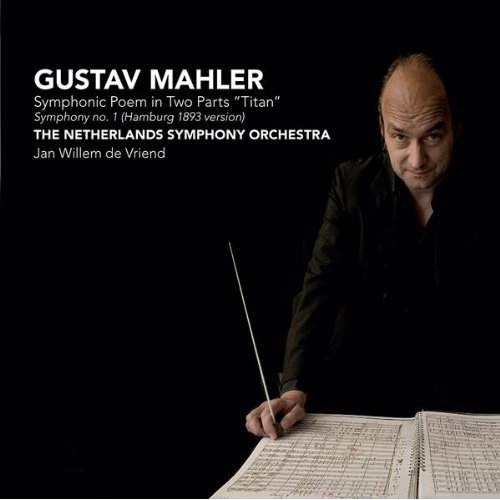
 Both
these new recordings restore ‘Blumine’, the original second
movement of the symphony before Mahler discarded it. Both make
a good case for it, with the movement integrated in its proper
place on the Challenge Classics version, and both are well recorded.
Neither version, however, is likely to shake my allegiance to
Kubelík in the revised version (DG Originals 449 7352).
Both
these new recordings restore ‘Blumine’, the original second
movement of the symphony before Mahler discarded it. Both make
a good case for it, with the movement integrated in its proper
place on the Challenge Classics version, and both are well recorded.
Neither version, however, is likely to shake my allegiance to
Kubelík in the revised version (DG Originals 449 7352).
Challenge Classics: On emusic two of the tracks
are at 320kbps, the others at 224k and 225k. On classicsonline
all tracks are at the maximum 320k.
Coviello: The passionato track labelling is
rather confusing, with tracks 1 and 5 both labelled ‘Blumine
(discarded)’. In fact, the Blumine movement is track 1 only:
the logical place to put it, of course, would have been track
2, since it originally formed the second movement.
Ralph VAUGHAN WILLIAMS (1872-1958)
Dona Nobis Pacem [33:29]; Sancta
Civitas [31:10]
Christina Pier; Matthew Brook; Andrew Staples; Bach Choir; Bournemouth
Symphony Orchestra/David Hill – rec. September, 2009. DDD.
NAXOS 8.572424 [64:39] – from classicsonline
(mp3)
An Oxford Elegy1,2,3 [21:56]; Whitsunday Hymn2
[3:46]; Flos Campi4 [19:50]; Sancta Civitas5
[31:12]
John Westbrook (narrator)1; King’s College Choir,
Cambridge2; Cecil Aronowitz (viola)4;
Jacques Orchestra3,4; London Symphony Orchestra5/Sir
David Willcocks – rec.1968. ADD.
EMI BRITISH CLASSICS 5672212 [76:44] – deleted on CD;
available from passionato
(mp3 and lossless)

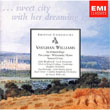 These
are two fine recordings of Sancta Civitas. The choice
is between the new digital recording in good mp3 sound from
classicsonline, with its more conventional coupling of Dona
Nobis Pacem, and the re-mastered 1968 analogue version from
EMI, still sounding well, especially in lossless form, and coupled
with the beautiful but neglected Oxford Elegy. If you
already have a good recording of Dona Nobis Pacem, such
as Bryden Thomson’s excellent version on Chandos (CHAN8590,
with Five Mystical Songs, on CD, mp3 or lossless download
from theclassicalshop:
see review
in March 2010 Roundup), I urge you to go for the EMI – deleted
on CD but still available as a download. The Oxford Elegy,
based on Matthew Arnold’s Scholar Gipsy and Thyrsis,
a work as beautiful and powerful in its own way as Sancta
Civitas, receives a fine performance from the Cambridge
forces. John Westbrook’s delivery of the words is just right
– passionate where passion is called for, but never hammy. My
only reservation is that at £7.99 (mp3) or £9.99 (flac), the
download is more expensive than the CD when it was last available.
If, for any reason, the new Naxos doesn’t appeal and you don’t
want the Elegy, snap up the Hickox version of Dona
nobis and Sancta civitas on EMI British Composers
7547882 before that disappears, too.
These
are two fine recordings of Sancta Civitas. The choice
is between the new digital recording in good mp3 sound from
classicsonline, with its more conventional coupling of Dona
Nobis Pacem, and the re-mastered 1968 analogue version from
EMI, still sounding well, especially in lossless form, and coupled
with the beautiful but neglected Oxford Elegy. If you
already have a good recording of Dona Nobis Pacem, such
as Bryden Thomson’s excellent version on Chandos (CHAN8590,
with Five Mystical Songs, on CD, mp3 or lossless download
from theclassicalshop:
see review
in March 2010 Roundup), I urge you to go for the EMI – deleted
on CD but still available as a download. The Oxford Elegy,
based on Matthew Arnold’s Scholar Gipsy and Thyrsis,
a work as beautiful and powerful in its own way as Sancta
Civitas, receives a fine performance from the Cambridge
forces. John Westbrook’s delivery of the words is just right
– passionate where passion is called for, but never hammy. My
only reservation is that at £7.99 (mp3) or £9.99 (flac), the
download is more expensive than the CD when it was last available.
If, for any reason, the new Naxos doesn’t appeal and you don’t
want the Elegy, snap up the Hickox version of Dona
nobis and Sancta civitas on EMI British Composers
7547882 before that disappears, too.
There is an alternative version of the Oxford
Elegy on Nimbus NI5166, also available from classicsonline,
this time from an Oxford source, directed by Stephen Darlington.
Subscribers can try the Nimbus here
and the new Naxos here
from Naxos Music Library – the Naxos booklet is available from
this source; it also comes with the classicsonline download.
No doubt the Naxos will also appear in lossless sound from passionato
in due course but at present booklets are not available from
that source.
- Please see also review
of the Naxos recording by John Quinn (Bargain of the Month).
English Wind Band Classics
Gustav HOLST (1874-1934) Suite
No. 1 [9:55]; Suite No. 2 [10:57]; Hammersmith [13:50]
Ralph VAUGHAN WILLIAMS (1872-1958)
English Folksong Suite [10:30]; Toccata Marziale [4:41]
Gordon JACOB (1895-1984)
William Byrd Suite for Symphonic Band [18:32]
William WALTON (1902-1983)
Crown Imperial [9:50]
Eastman Wind Ensemble/Frederick Fennell - rec. 1955-59. Mono/stereo.
ADD
BEULAH 1PD82 [77:18] - from iTunes
(mp3) via the Beulah webpage.
The Holst items are also available from Beulah Extra here.
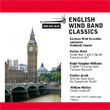 This,
like the Collins Sibelius which I reviewed last month, came
to me on CD, as I don’t have press access to iTunes. These recordings
are just as much classics as the Sibelius: not only are the
performances every bit as good as any versions I’ve ever heard
of this repertoire, they also still sound well, especially Hammersmith
and the Jacob and Walton pieces, which are in stereo. There
is an equally distinguished rival version of most of this repertoire
in the form of an ASV recording now on the budget Resonance
label (CDRSN3006, London Wind Orchestra/Dennis Wick, around
£5 in the UK). Why not buy both?
This,
like the Collins Sibelius which I reviewed last month, came
to me on CD, as I don’t have press access to iTunes. These recordings
are just as much classics as the Sibelius: not only are the
performances every bit as good as any versions I’ve ever heard
of this repertoire, they also still sound well, especially Hammersmith
and the Jacob and Walton pieces, which are in stereo. There
is an equally distinguished rival version of most of this repertoire
in the form of an ASV recording now on the budget Resonance
label (CDRSN3006, London Wind Orchestra/Dennis Wick, around
£5 in the UK). Why not buy both?
- See also review
by MWI Classical Editor Rob Barnett.
Ernö (Ernst von) DOHNÁNYI
(1877-1960)
Szimfonicus percek (Symphonic Minutes), Op.36 [14:58]
Variations on a Nursery Song, Op.25* [24:24]
Suite in f# minor, Op.19 [30:18]
Eldar Nebolsin (piano)*; Buffalo Philharmonic Orchestra/JoAnn
Falletta
rec. October and November, 2008, and February, 2009. DDD.
NAXOS 8.572303 [69:39] – from classicsonline
(mp3)
Suite in f# minor, Op.19 [28:42]; Variations
on a Nursery Theme, Op.25* [24:31];The Veil of Pierrette, Op.18
[16:23]
Howard Shelley (piano)*; BBC Philharmonic/Matthias Bamert -
rec. 1999. DDD
CHANDOS CHAN9733 [69:52] – from
theclassicalshop
(mp3 and lossless)
 The
Nursery Variations is not an easy work to bring off.
Pianist and conductor together have to get just right the balance
between the maestoso opening, with all its pomp and ceremony,
and the nursery song when it appears. (It’s Twinkle, twinkle,
little star, of course for Anglophone listeners, Ah vous-dirai-je,
maman for others.) For those of us with long memories, Julius
Katchen and Sir Adrian Boult achieved that balance on a 1954
recording which is now available from classicsonline for £1.99
(9.80648 here,
though not in the US and several other counties). Of the modern
versions which I have heard, Mark Anderson and Adam Fischer
with the Hungarian State Orchestra come closest (Nimbus NI5349
– from classicsonline,
but not everyone will want another version of Brahms’ First
Piano Concerto, which is the coupling. Subscribers can try
that recording from the Naxos Music Library here,
but be prepared for the player partially to spoil your listening
pleasure by introducing breaks between variations. UK subscribers
can hear the Katchen/Boult on NML here
without breaks – it’s presented on one long track and the recording
is quite acceptable.
The
Nursery Variations is not an easy work to bring off.
Pianist and conductor together have to get just right the balance
between the maestoso opening, with all its pomp and ceremony,
and the nursery song when it appears. (It’s Twinkle, twinkle,
little star, of course for Anglophone listeners, Ah vous-dirai-je,
maman for others.) For those of us with long memories, Julius
Katchen and Sir Adrian Boult achieved that balance on a 1954
recording which is now available from classicsonline for £1.99
(9.80648 here,
though not in the US and several other counties). Of the modern
versions which I have heard, Mark Anderson and Adam Fischer
with the Hungarian State Orchestra come closest (Nimbus NI5349
– from classicsonline,
but not everyone will want another version of Brahms’ First
Piano Concerto, which is the coupling. Subscribers can try
that recording from the Naxos Music Library here,
but be prepared for the player partially to spoil your listening
pleasure by introducing breaks between variations. UK subscribers
can hear the Katchen/Boult on NML here
without breaks – it’s presented on one long track and the recording
is quite acceptable.

The all-Dohnanyi programmes on Naxos and Chandos are more logical,
but, with two items overlapping, they are clearly complementary
– attractive as are the
Symphonic Minutes on Naxos and
the extracts from
Pierette on Chandos, the
Variations
and the
Suite in f# provide the substance of both sandwiches.
Keith Anderson, in his usual excellent notes in the Naxos booklet,
likens the first appearance of the nursery tune to the famous
tag of Horace –
Parturient montes, nascetur ridiculus mus:
the birth pangs of the mountains bring forth a silly little mouse.
(Actually, surprisingly
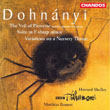
for
someone with his academic background, Anderson quotes the first
two words in reverse – from memory?) I’m not quite sure that Nebolsin
and Falletta quite achieve that contrast as well as Katchen and
Boult, though they come close. The opening is suitably portentous
and the theme innocent-sounding enough, almost as if it were picked
out by a beginner, but I missed that last touch of magic which
the older recording achieves. It’s probably a subjective reaction,
which others may not share: in fact, I was more attracted to the
new performance with the second hearing.
The Chandos probably remains a slightly more
secure recommendation. Both come in good mp3 sound and the Chandos
is additionally available as a lossless download. Subscribers
can try them both in the Naxos Music Library.
Ottorino RESPIGHI
(1879-1936) La Boutique Fantasque (arr.
from ROSSINI)
London Symphony Orchestra/Ernest Ansermet – rec.1950. mono ADD
BEULAH EXTRA 7BX68 [34:34] – from Beulah
(mp3)
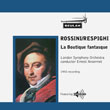 This
1950 mono version of la Boutique, one of the first ever
LPs, has also appeared on Australian Eloquence coupled with
the Pines and Fountains of Rome (480 0024), which
John Sheppard aptly described as ‘an enjoyable and ... valuable
recording’ – see review.
The performance is, indeed, enjoyable and the playing of the
LSO rather more secure than some of that provided by Ansermet’s
own Orchestre de la Suisse Romande elsewhere.
This
1950 mono version of la Boutique, one of the first ever
LPs, has also appeared on Australian Eloquence coupled with
the Pines and Fountains of Rome (480 0024), which
John Sheppard aptly described as ‘an enjoyable and ... valuable
recording’ – see review.
The performance is, indeed, enjoyable and the playing of the
LSO rather more secure than some of that provided by Ansermet’s
own Orchestre de la Suisse Romande elsewhere.
The recording, re-mastered from the original
tapes, has worn quite well and the download is well worth the
asking price of £2. If you want the other two items, however,
the Eloquence CD can be ordered from Buywell for £5.14. This
version of Boutique has also been issued on Somm (SOMMCD027).
Decca later remade la Boutique with Solti – a rather
more high-powered version in an early stereo recording which
must surely reappear some time.
Bela BARTÓK (1881-1945)
Falun, Three Village Scenes, for female chorus &
chamber orchestra, Sz. 79, BB 87b [10:27]; Concerto for Orchestra,
Sz. 116, BB 127 [36:01]; Kossuth, symphonic poem for
orchestra, Sz. 21, BB 31 [19:53]; Hungarian Peasant Songs (Magyar
parasztdalok), for orchestra, Sz. 100, BB 107 [9:23]; Hungarian
Sketches (Magyar képek), for orchestra, Sz. 97,
BB 103 [11:14]; 7 Romanian Folk Dances (Román népi
táncok), for orchestra, Sz. 68, BB 76 [5:58]; Transylvanian
Dances, for orchestra (arranged from Sonatina), Sz. 96, BB 102b
[4:16]; Romanian Dance (Román tánc), for
orchestra, Sz. 47a, BB 61 [4:28]; The Miraculous Mandarin,
pantomime in 1 act, Sz. 73, BB 82 (Op. 19) [31:07]
The Wooden Prince, Sz. 60, BB 74 (Op. 13) [51:27]; Dance
Suite (Táncszvit) for orchestra, Sz. 77, BB 86a
[16:31]
Budapest Festival Orchestra/Iván Fischer – rec. Budapest,
1996/97. DDD.
PHILIPS 475 7684 [3 CDs 66:46 + 66:44 + 68:03] – from
passionato
(mp3)
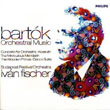 Though
still listed in the Decca international catalogue, these recordings
seem to be no longer available on CD in the UK, either as a
set or individually, ironically at the very time when many music
lovers will be looking for Fischer’s recording of the Concerto
for Orchestra particularly, since it has recently, justifiably,
featured in two recent issues of Gramophone as the top
recommendation. Those wishing to obtain the Concerto for
Orchestra separately for £5.89 will not be disappointed,
but the whole 3-CD set contains such fine performances, available
at the reasonable price of £17.99, in good 320k mp3 sound, that
you should really go for the whole works.
Though
still listed in the Decca international catalogue, these recordings
seem to be no longer available on CD in the UK, either as a
set or individually, ironically at the very time when many music
lovers will be looking for Fischer’s recording of the Concerto
for Orchestra particularly, since it has recently, justifiably,
featured in two recent issues of Gramophone as the top
recommendation. Those wishing to obtain the Concerto for
Orchestra separately for £5.89 will not be disappointed,
but the whole 3-CD set contains such fine performances, available
at the reasonable price of £17.99, in good 320k mp3 sound, that
you should really go for the whole works.
If you feel that the 3-CD set is too much to
take in at one go, passionato also offer the 2-CD Double Decca
set of Solti’s Chicago performances for £12.99, also very well
worth considering, though not much of a saving, if any, on the
parent CDs. Amazon also have the Reiner recording of the Concerto
for Orchestra on RCA, coupled with the Music for Strings
Percussion and Celesta and Hungarian Sketches – puzzlingly
this is offered in two guises for £7.49 and £7.99 respectively,
which is not much of a bargain when dealers offer it on hybrid
SACD for very little more at around £8.25 (see review
by Colin Clarke).
Igor STRAVINSKY (1882–1971)
Le Baiser de la Fée (The
Fairy’s Kiss) [42:25];
Scènes de Ballet [16:08]
BBC Scottish Symphony Orchestra/Ilan Volkov
rec. City Halls, Candleriggs, Glasgow, 15-16 November 2008.
DDD.
HYPERION CDA67697 [58:15] – from Hyperion
(mp3 and lossless)
 Very
good performances of two undervalued Stravinsky works – Baiser
de la Fée, in particular, ought to be much better
known. This performance is fully the equal of the Reiner/RCA
from which I first got to know the music and sounds much better
than that did on LP. Scènes de Ballet may have
less going for it, but it’s still well worth having. My only
grumble concerns the short playing time, which is taken into
account in setting the download price at just £6.99 in either
format.
Very
good performances of two undervalued Stravinsky works – Baiser
de la Fée, in particular, ought to be much better
known. This performance is fully the equal of the Reiner/RCA
from which I first got to know the music and sounds much better
than that did on LP. Scènes de Ballet may have
less going for it, but it’s still well worth having. My only
grumble concerns the short playing time, which is taken into
account in setting the download price at just £6.99 in either
format.
Classicsonline and passionato have the Robert
Craft recording of Le Baiser de la Fée (Naxos
8.557503 – review here,
here
and here)
and theclassicalshop offer Neeme Järvi on one or two CDs
(CHAN8360
or, better value at 2-for1, CHAN241-8M).
Gerald FINZI (1901–1956)
Dies natalis, Op. 8, Cantata for high voice and string
orchestra [28:00]
Benjamin BRITTEN(1913–1976)
Les Illuminations, Op. 18, for soprano or tenor and string
orchestra [22:59]
Quatre Chansons françaises for high voice and
orchestra (edited by Colin Matthews) [13:24]
Frederick DELIUS (1862–1934)
A Late Lark (edited by Sir Thomas Beecham and Eric Fenby, prepared
for publication by Robert Threlfal) [5:20]
Susan Gritton (soprano); BBC Symphony Orchestra/Edward Gardner
rec. BBC Maida Vale, London, 20-22 November 2009. DDD.
CHANDOS CHAN10590 [68:15] – from the classicalshop
(mp3 and lossless)
GERALD FINZI (1901-1956)
Dies Natalis Op.8 [24:20]
Intimations of Immortality Op.29 [42:15]
John Mark Ainsley (tenor); Corydon Singers; Corydon Orchestra/Matthew
Best
rec. All Hallows, Gospel Oak, London, February 1996. DDD.
HYPERION CDA66876 [66:55] – from Hyperion
(mp3 and lossless)

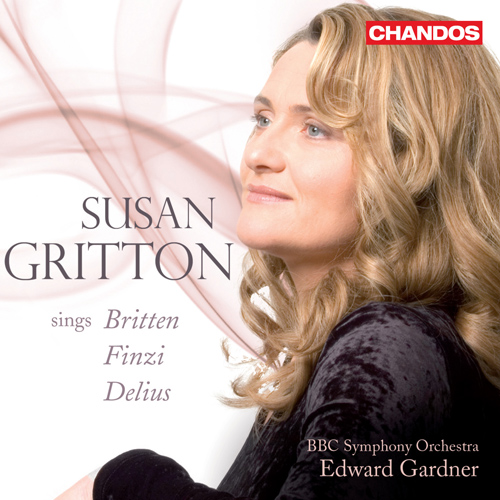 Hearing
a soprano in Dies natalis and Les Illuminations
takes quite a lot of getting used to, since both of these are
so familiar in their tenor garb, but these performances make
the effort very well worthwhile. The less familiar Chansons
and the Delius bonne bouche round off a very worthwhile
programme and the lossless download does full justice to the
recording.
Hearing
a soprano in Dies natalis and Les Illuminations
takes quite a lot of getting used to, since both of these are
so familiar in their tenor garb, but these performances make
the effort very well worthwhile. The less familiar Chansons
and the Delius bonne bouche round off a very worthwhile
programme and the lossless download does full justice to the
recording.
Something of a surprise here: not having heard
Dies Natalis sung by a soprano before, I fully expected
to emerge with a clear preference for the Hyperion recording.
In the event, I thought John Mark Ainsley’s singing just a trifle
colourless by comparison with other recordings of this wonderful
work – and by comparison with Susan Gritton’s new version.
For the Immortality Ode, go for the
Lyrita version with Ian Partridge and Vernon Handley, coupled
with Hadley’s The Trees So High (SRCD.238 – see reviews
here,
here
and here).
Download from emusic here.
Dmitri SHOSTAKOVICH
(1906-1975)
Symphony No.8 in c minor, Op.65 (1947)
Royal Liverpool Philharmonic Orchestra/Vasily Petrenko
NAXOS 8.572392 [61:57] – from classicsonline
(mp3)
 I’m
taking a second bite at this cherry, the third in Naxos’s series
of Shostakovich symphonies with Petrenko at the helm. Last month
I was able to hear it only from the Naxos Music Library and
was put off from a proper appreciation by the short gaps which
the NML Music Player introduces between movements where the
music should be continuous. As is often the case with second
hearings, the reservations which I expressed then have very
largely disappeared, mostly thanks to my being able to hear
it without gaps.
I’m
taking a second bite at this cherry, the third in Naxos’s series
of Shostakovich symphonies with Petrenko at the helm. Last month
I was able to hear it only from the Naxos Music Library and
was put off from a proper appreciation by the short gaps which
the NML Music Player introduces between movements where the
music should be continuous. As is often the case with second
hearings, the reservations which I expressed then have very
largely disappeared, mostly thanks to my being able to hear
it without gaps.
Residual doubts have more to do with the music
than the performance. The Eighth Symphony is a difficult work
to bring off: Stalin was looking for a celebration of ‘his’
victory comparable in power with the Seventh, the ‘Leningrad’
Symphony, but he got something very different and it soon found
its way onto a list of proscribed works. As Richard Whitehouse
points out in his excellent notes, Shostakovich himself had
periodic doubts about it.
As for alternative versions: in my review
of his complete box set of the symphonies (Decca 475 8748, or
download from passionato)
I felt that Ashkenazy was trying a little too hard to bring
out the subversive nature of the music which Shostakovich supposedly
claimed for it. I still think there is a place for Haitink’s
interpretation (425 0712 – the budget Eloquence reissue seems
to have been deleted, except as a download from passionato)
and Barshai on Regis offers a notable bargain, though not as
a download.
Astor PIAZZOLLA (1921-1992)
Sinfonia Buenos Aires, Op. 15 (1951) [25:55]
Concerto for Bandoneón, String Orchestra, and Percussion
(1979) [22:10]
Mar del Plato 70 (c. 1965) (arranged for symphony orchestra,
José Carli, 1995) [3:29]
Cuatro Estaciones Porteñas (1965-1969) (arranged
for symphony orchestra, Carlos Franzetti, 1989) [19:05]
Juan José Mosalini (bandoneón, Concerto)
Württembergische Philharmonie Reutlingen/Gabriel Castagna
rec. Württembergische Philharmonie Reutlingen, Germany,
31 March-4 April 2006. DDD.
CHANDOS CHAN10419 [71:10] – from theclassicalshop
(mp3 or lossless)
- see review
by Brian Burtt.
 The
Sinfonia and the Bandoneón Concerto are
larger-scale works than we are used to from Piazzolla and the
other two works have also been arranged for forces larger than
usual. Despite all the qualities which Brian Burtt rightly points
to in this recording – it’s well worth having for the Concerto
alone – I felt a little uneasy to hear the familiar Cuatros
Estaciones in such a grand arrangement.
The
Sinfonia and the Bandoneón Concerto are
larger-scale works than we are used to from Piazzolla and the
other two works have also been arranged for forces larger than
usual. Despite all the qualities which Brian Burtt rightly points
to in this recording – it’s well worth having for the Concerto
alone – I felt a little uneasy to hear the familiar Cuatros
Estaciones in such a grand arrangement.
Quite fortuitously, I had just received another
recording of the Cuatro Estaciones and other works by
Piazzolla, performed in 1993 by members of the Orquestra de
Camera de Blumenau under the direction of Cláudio Ribeiro,
whom I encountered accidentally via email when I thought I was
replying to a query which had been forwarded to me by another
conductor of the same name. The arrangement on that recording,
for Piano, Violin, Viola and Cello, by José Bragato,
can claim authenticity, since Bragato was a close friend of
the composer and had a hand in commissioning the work. Though
Maestro Ribeiro and most of the performers are Brazilian, the
Uruguayan pianist Carlos Garofali performs in two other works,
Lo que vendrá and Buenos Ayres hora cero
and another Uruguayan, Carlos Magallanes, plays the bandoneón
in the latter piece, so the recording has a broad Latin American
imprimatur.
That Brazilian recording is currently deleted,
but I understand that it might be revived if there is sufficient
interest. As I now regard it as my benchmark for the Cuatro
Estaciones, I have expressed my own view that it should
be reissued. Those interested may wish to contact Maestro Ribeiro
via his website – here
– click on ‘Discografia’, then on the Piazzolla CD cover to
hear a sample. (The spelling Quatro for Cuatro
betrays the Brazilian origin of the recording.)
You’ll find another recording on the website,
one which is still available:
Música Nova do Rio Grande do Sul
Brasil (New Music from the Rio Grande of South Brazil):
Luis COSME (1908-1965) Lambe-lambe
[6:34]; Fernando MATTOS
(b.1963) Pequeno Requiem Instrumental [15:08]; Bruno
KIEFFER (1923-1987)
Dialogue for Piano and Orchestra [16:20]; Armando
ALBUQUERQUE (1901-1986) Suite Breve [12:44];
Radamés GNATTALI (1906-1988)
Sinfonia Popular No.4 [16:13]
Orquestra Sinfônica de Porto Alegre/Cláudio Ribeiro
USA DISCOS 459 416 [67:47]
 Though
USA Discos don’t seem to have a UK distributor, this is, after
all, MusicWeb International and you may find that there
is one in your country; alternatively, contact them directly:
www.usadiscos.com.br.
The webpage is in Portuguese; contact the Ribeiro webpage if
you get stuck.
Though
USA Discos don’t seem to have a UK distributor, this is, after
all, MusicWeb International and you may find that there
is one in your country; alternatively, contact them directly:
www.usadiscos.com.br.
The webpage is in Portuguese; contact the Ribeiro webpage if
you get stuck.
There’s nothing here more avant-garde than,
say, Bartók; the Kieffer Dialogue is a little angular,
but even that won’t bite, and I enjoyed hearing some fine music
from composers of whom I had never even heard in authentic performances,
well recorded. The Gnattali Symphony really is as approachable
as its name implies. What Brazilian composers can you even name,
apart from Villa-Lobos? As Maestro Ribeiro himself expressed
his mission in an email: “I believe that people deserve to make
contact with other new music. I also think that a musician of
the Third Millenium has another important mission too:
to spread a new approach with music, to give people
a message of the good, showing a new possible
society based on better ethics and tolerance. Music has
a vital role in that process.”
In brief
Antonio VIVALDI (1678-1741)
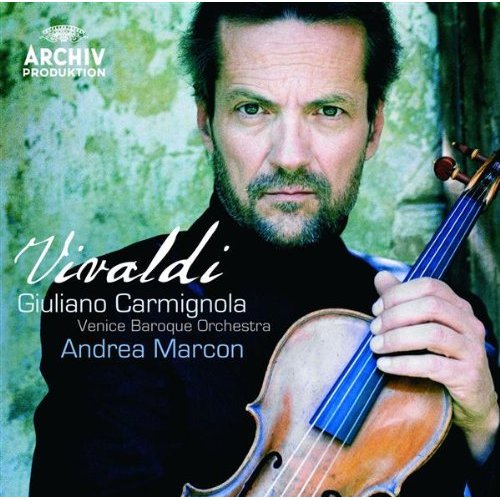 Concertos
for Violin, Strings and Continuo: in g minor, RV 331 (c. 1730-1735)
[12:57]; in C, RV 190 (1735) [14:03]; in g minor, RV 325 (1725)
[07:32]; in D, RV 217 (c. 1727) [12:29]; in G, RV 303 (1724)
[12:20]
Concertos
for Violin, Strings and Continuo: in g minor, RV 331 (c. 1730-1735)
[12:57]; in C, RV 190 (1735) [14:03]; in g minor, RV 325 (1725)
[07:32]; in D, RV 217 (c. 1727) [12:29]; in G, RV 303 (1724)
[12:20]
Giuliano Carmignola (baroque violin); Venice Baroque Orchestra/Andrea
Marcon
rec. 2006. DDD
DG ARCHIV 477 6005 [58:18] – from passionato
(mp3)
- See review
by Michael Cookson: “Vivaldi lovers will not want to be
without this beautifully performed and recorded release.”
The mp3 transfer is good.
George Frideric HANDEL (1685-1759)
 Radamisto:
‘Se teco vive il cor’ [3:16]; Rodelinda: ‘Io t’abbraccio’
[6:52]; Solomon: ‘Welcome as the dawn of day’ [3:09];
Theodora: ‘Streams of pleasure ever flowing’ [6:47];
Radamisto:
‘Se teco vive il cor’ [3:16]; Rodelinda: ‘Io t’abbraccio’
[6:52]; Solomon: ‘Welcome as the dawn of day’ [3:09];
Theodora: ‘Streams of pleasure ever flowing’ [6:47];
Ottone: ‘Notte cara!’ [4:35]; Theodora: ‘To thee,
thou glorious son of worth’ [4:54];
Ariodante: ‘Bramo haver mille vite’ [4:50]; Belshazzar:
‘Great victor, at your feet I bow’ [4:57]; Tamerlano:
‘Vivo in te’ [7:00]; Sosarme: ‘Per le porte del tormento’
[7:32];
Agrippina: ‘No, no, ch’ io non apprezzo’ [3:53]; Giulio
Cesare: ‘Caro! Bella! [4:48]
Rosemary Joshua (soprano); Sarah Connolly (mezzo); The English
Concert/Harry Bicket
rec. Church of St Silas the Martyr, London, 20-23 July 2009.
DDD
CHANDOS CHAN0767 [62:44] – from theclassicalshop
(mp3 and lossless)
- see review
by John-Pierre Joyce: “for sheer vocal beauty, there is
very little to fault”.
A most enjoyable addition to the Handel recitals
which I recommended in my November 2009 and December 2009 Download
Roundups. The quality of the lossless download is excellent.
Pyotr Ilyich TCHAIKOVSKY (1840-1893)
Swan Lake, Op.20 - Ballet in Three Acts (1875)
(Mariinsky performing edn 1895) [106:59]
Orchestra of the Mariinsky Theatre, St. Petersburg/Valery Gergiev
rec. Mariinsky Theatre, 28 May-4 June 2006 . DDD
DECCA 475 7669 [58:49 + 48:10] – from passionato
(mp3)
Highlights disc 475 9080 [76:15] – from passionato
(mp3)
- see review
by Tony Haywood.
 Be
aware that the claim on the passionato webpage that this is
a ‘full’ recording is misleading, as TH’s review makes clear,
which means that the highlights disc is better value and may,
in any case, be enough for many people. The mp3 transfer is
good.
Be
aware that the claim on the passionato webpage that this is
a ‘full’ recording is misleading, as TH’s review makes clear,
which means that the highlights disc is better value and may,
in any case, be enough for many people. The mp3 transfer is
good.
 If
you are looking for a historic account of just the Swan
Lake Suite, Beulah Extra offer for £1 the Philharmonia
Orchestra with Herbert von Karajan, a 1959 recording,
in good mp3 sound (1BX18, here).
If
you are looking for a historic account of just the Swan
Lake Suite, Beulah Extra offer for £1 the Philharmonia
Orchestra with Herbert von Karajan, a 1959 recording,
in good mp3 sound (1BX18, here).
Gustav MAHLER (1860-1911)
Symphony No. 2 in C minor, Resurrection (1894) [84:17]
Anne Schwanewilms (soprano); Lioba Braun (contralto)
Chor der Bayerische Symphoniker/Rolf Beck
Bamberger Symphoniker and Bayerische Staatsphilharmonie/Jonathan
Nott
rec. 14-15 March 2008, Joseph-Keilberth-Saal, Konzerthalle Bamberg,
Germany. DDD.
TUDOR 7158 [32:53 + 51:24] – from classicsonline
or emusic
(mp3)
- see review
by Dan Morgan (Recording of the Month)
Yvonne Kenny (soprano); Jard van Nes (mezzo); London Philharmonic
Choir
London Philharmonic Orchestra/Klaus Tennstedt
rec. live, Southbank Centre’s Royal Festival Hall, London, 20
February 1989. DDD
German texts and English translations included in booklet at
Naxos Music Library and with purchase from classicsonline.
LPO LIVE LPO0044 [25:02 + 67:48] – from classicsonline
or emusic (both mp3)
- see review by John Quinn (Recording of the Month)
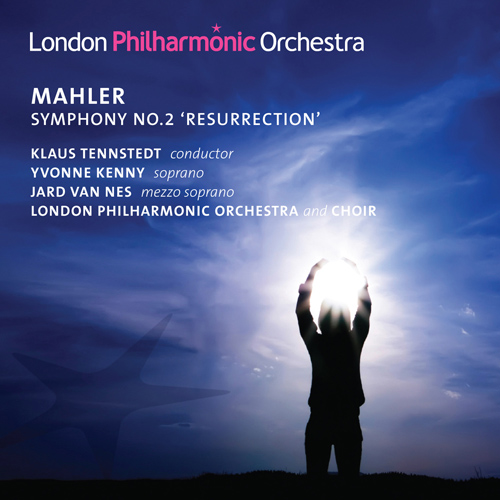
 Two
Recordings of the Month of Mahler’s Resurrection Symphony
in quick succession augur well for the centenary year(s). So
far I have been able to hear only the very broad-tempo opening
movement of the Tennstedt from the Naxos Music Library here,
but what I have heard of both versions makes them strong contenders
to rival Klemperer as my top recommendation – still just about
the fastest on record, despite his reputation for slow tempi,
beating Tennstedt by around ten minutes.
Two
Recordings of the Month of Mahler’s Resurrection Symphony
in quick succession augur well for the centenary year(s). So
far I have been able to hear only the very broad-tempo opening
movement of the Tennstedt from the Naxos Music Library here,
but what I have heard of both versions makes them strong contenders
to rival Klemperer as my top recommendation – still just about
the fastest on record, despite his reputation for slow tempi,
beating Tennstedt by around ten minutes.
On emusic, three tracks of the Tudor recording
are at 320kbps, the others at 224 and 207. If you must have
all five movements at 320k, you will need to pay rather more
for the version from classicsonline.
Klemperer’s 1962 version is available in three
formats from passionato: the least expensive is the Studio edition
(2668352,
£5.99 for mp3 or £7.99 for lossless).
Ernö (Ernst) von DOHNÁNYI
(1877-1960)
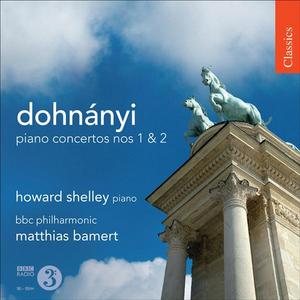 Piano
Concerto No. 1 in e minor op. 5 (1897-99)1 [43:34]
Piano
Concerto No. 1 in e minor op. 5 (1897-99)1 [43:34]
Piano Concerto No. 2 in b minor op. 42 (1946-47)2
[28:49]
Howard Shelley (piano); BBC Philharmonic/Matthias Bamert
rec. 20011 and 20042. DDD
CHANDOS CHAN10599X [72:25] – from theclassicalshop
(mp3 or lossless)
- see review
by MWI Classical Editor Rob Barnett.
The Concertos remain available separately,
with different couplings, at full price. The new coupling brings
these performances into direct competition with Hyperion CDA66684
– see review.
The Chandos mp3 at £4.99 is less expensive than the Hyperion
at £7.99 but the two downloads sell for the same price of £7.99
in lossless sound.
Sergei PROKOFIEV (1891-1953)
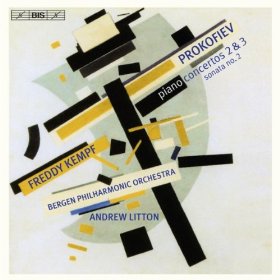 Piano
Concerto No.2 in g minor, Op.16 [32:04]
Piano
Concerto No.2 in g minor, Op.16 [32:04]
Piano Sonata No.2 in d minor, Op.14 [20:50]
Piano Concerto No.3 in C major, Op.26 [29:50]
Freddy Kempf (piano); Bergen Philharmonic Orchestra/Andrew Litton
rec. Bergen and Stockholm, July-August, 2008. DDD.
BIS-SACD-1820 [80:48] – from passionato
(mp3 and lossless)
- see review
by Dominy Clements: “This is a recording and set of performances
about which making a big fuss would seem entirely appropriate.”
Exactly – the best recording of Prokofiev Piano Concertos
since Richter (No.5, DG) and Argerich (1 and 3, EMI; No.3,
DG).
Sir Arthur BLISS (1891-1975)
 Meditations
on a Theme by John Blow (1955) [33:46]
Meditations
on a Theme by John Blow (1955) [33:46]
Metamorphic Variations (1972) [38:49]
Bournemouth Symphony Orchestra/David Lloyd-Jones
rec. 11-12 May 2009, The Concert Hall, The Lighthouse, Poole,
Dorset. DDD
NAXOS 8.572316 [72:36] – from classicsonline
(mp3)
- see review
by John France: “I thoroughly enjoyed listening to this
CD. The quality of the sound is superb; the enthusiasm of
the orchestra and conductor is palpable. The learned essay
by Giles Easterbrook is excellent and gives a detailed analysis
of each piece ... the present recording is everything a
good performance ought to be – demanding, searching and
ultimately moving.” I need only add that the download does
the recording justice and that the booklet to which JF refers
comes as part of the deal from classicsonline.
Ernest John MOERAN (1894-1950)
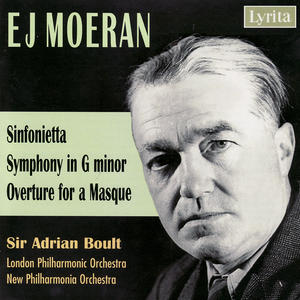 Sinfonietta
(1944) [23:16]; Symphony in g minor (1937) [44:24]; Overture
for a Masque (1944) [10:36]
Sinfonietta
(1944) [23:16]; Symphony in g minor (1937) [44:24]; Overture
for a Masque (1944) [10:36]
London Philharmonic Orchestra; New Philharmonia Orchestra/Sir
Adrian Boult
rec. 1968, 1970, 1975. ADD
LYRITA SRCD.247 [78:55] – from emusic
(mp3)
- see reviews by Jonathan Woolf - here
- and MWI Classical Editor Rob Barnett (Recording of the
Month) - here.
The mp3 transfer is good.
Gordon JACOB (1895-1984)
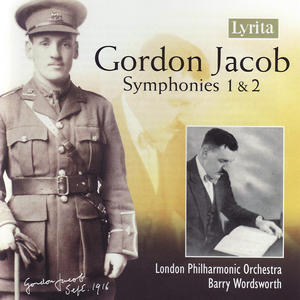 Symphony
No. 1 (1929) [34:18]*; Symphony No. 2 in C major (1945) [32:01]
Symphony
No. 1 (1929) [34:18]*; Symphony No. 2 in C major (1945) [32:01]
London Philharmonic Orchestra/Barry Wordsworth - rec. 1992.
DDD
* premiere recording
LYRITA SRCD.315 [66:25] – from emusic
(mp3)
- See reviews by Rob Barnett here
and Dr Geoff Ogram here.
The mp3 download sound does justice to the performances.
Thomas ADÈS (b.1971)
The Tempest (2004)
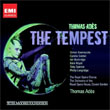 Kate
Royal (soprano) - Miranda; Ian Bostridge (tenor) - Caliban;
Simon Keenlyside (baritone) - Prospero; Toby Spence (tenor)
- Ferdinand; Philip Langridge (tenor) - King of Naples; Cyndia
Sieden (soprano) - Ariel; Donald Kaasch (tenor) - Antonio; Stephen
Richardson (bass-baritone) - Stefano; David Cordier (counter-tenor)
- Trinculo; Jonathan Summers (baritone) - Sebastian; Graeme
Danby (bass) - Gonzalo)
Kate
Royal (soprano) - Miranda; Ian Bostridge (tenor) - Caliban;
Simon Keenlyside (baritone) - Prospero; Toby Spence (tenor)
- Ferdinand; Philip Langridge (tenor) - King of Naples; Cyndia
Sieden (soprano) - Ariel; Donald Kaasch (tenor) - Antonio; Stephen
Richardson (bass-baritone) - Stefano; David Cordier (counter-tenor)
- Trinculo; Jonathan Summers (baritone) - Sebastian; Graeme
Danby (bass) - Gonzalo)
Orchestra and Chorus of the Royal Opera House, Covent Garden/Thomas
Adès
rec. live, 23, 26 March 2007, Royal Opera House, Covent Garden,
London. DDD
EMI CLASSICS 6952342 [72:36 + 44:48] – from passionato
(mp3)
- See review
by Dominy Clements. I should add for the benefit of fellow
stick-in-the-muds that I found this a tougher proposition
to come to terms with than the Adès Violin Concerto.
First Impressions
Dietrich BUXTEHUDE
(c.1637-1707) In te Domine speravi – Cantatas and
Motets
Currende/Erik van Nevel
ACCENT ACC24184 [58:24] – from passionato
(mp3 or lossless)
 A
good introduction to Buxtehude’s vocal music, well recorded.
Some of the works are very short – the title piece lasts little
more than two minutes – but there are several more substantial
works, including Herzlich Lieb hab’ich dich, O Herr at
21 minutes, words also set by Bach in two cantatas and the St
John Passion. There are no texts with the download, but
several of these are readily available online, often with translation,
including Herzlich Lieb here.
A
good introduction to Buxtehude’s vocal music, well recorded.
Some of the works are very short – the title piece lasts little
more than two minutes – but there are several more substantial
works, including Herzlich Lieb hab’ich dich, O Herr at
21 minutes, words also set by Bach in two cantatas and the St
John Passion. There are no texts with the download, but
several of these are readily available online, often with translation,
including Herzlich Lieb here.
Antonín
DVORĮK (1841-1904)
 Symphonies
Nos. 7 and 8
Symphonies
Nos. 7 and 8
Baltimore Symphony Orchestra/Marin Alsop
NAXOS 8.572112 [74:20] – from classicsonline
(mp3)
At first hearing, this presents a strong challenge
to existing recommendations. Just don’t overlook Kubelík
on DG in various permutations from passionato: Symphonies 8
and 9 (447 4122 here),
7 and 9 (466 994 2 here)
and the complete box set (463 1582 here).
MusicWeb International
Download
Sergei PROKOFIEV (1891-1953)
Six Pieces from the ballet Romeo and Juliet (1935) - transcribed
by Vadim Borisovsky [22:14] Dmitri
SHOSTAKOVICH (1906-1975)
Seven Preludes from Op.34 (1933) - transcribed by Vadim Borisovsky;
Nos.10, 14, 15, 16, 17, 18, 24 [10:26]; Viola Sonata Op.147
(1975) [31:36] Robin Ireland (viola); Tim Horton (piano) rec.
July 2009 at Potton Hall, Suffolk NIMBUS NI 6117 [65:30]
- from MusicWeb (lossless) £8 payable in Dollars equivalent
using PayPal. Cover and booklet notes available as a pdf file.
Download
here
- See review by Jonathan Woolf here.
This download represents the first fruits of collaboration
between MWI and High definition Tape Transfers, initially of
Nimbus recordings with, it is hoped, other labels soon. The
repertoire may not be the most exciting - I thought the excerpts
from Romeo and Juliet inevitably rather pale when one recalls
the orchestral original - but the Shostakovich items, especially
the Viola Sonata, are well worth having in such dedicated performances.
There are, in fact, few rivals available as downloads - Nobuko
Imai and Roland Pontinen from BIS on passionato, coupled with
Rubinstein, Glinka, Glazunov and Stravinsky probably offer the
strongest of these.
The recording is good: I haven't heard the CD, but I have no
doubt that this lossless (flac) transfer offers a true reflection.
iPod aficionados will be disappointed that there is no mp3 equivalent,
but the music plays very well in Squeezebox. At £8 ($11),
it offers good value: most websites, apart from Hyperion, offer
mp3 at around this price, with lossless usually a couple of
pounds more expensive. All in all, I rate this an encouraging
start.
Addenda and Corrigenda
The following items relate to various Beulah Extra reviews in
this roundup:
The typo on the cover of Haydn's World on the Moon has been
corrected and the run out left on Haydn Symphony No.95 has also
been removed.
The Ansermet La Boutique was taken from disc not tape. The
Solti version to which I refer is scheduled for release in the
Autumn.
The Bournemouth SO in the alternative recording of Hérold's
Zampa Overture is conducted by Dan Godfrey not Isidore.




 All Nimbus reviews
All Nimbus reviews








